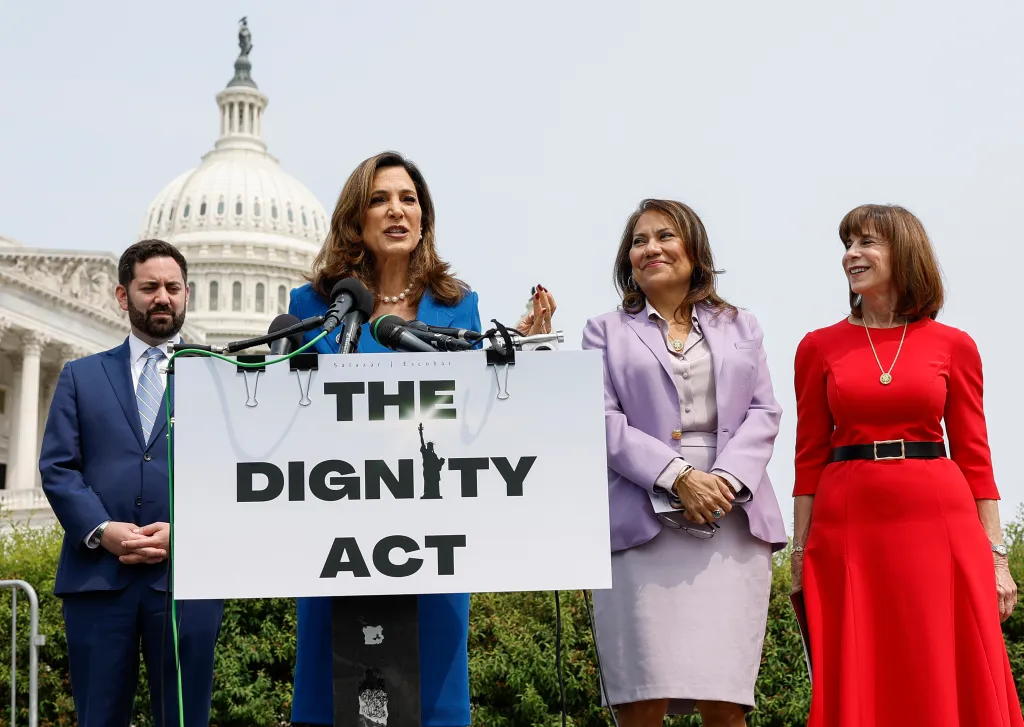
During this time of fear and division in the United States, it is heartening to see an example of courage and unity, especially as it pertains to one of our most contentious issues: immigration.
Donald Trump seized on fears related to immigration in the 2024 presidential campaign to help win a second term in office, but he has shown no interest in developing a plan to actually solve the nation’s immigration challenges or unite the country. His way remains that of the clenched fist, not the welcoming hand or the warm embrace. He seems unmoved by the uplifting poetry of Emma Lazarus that graces the Statue of Liberty: “Give me your tired, your poor, your huddled masses yearning to breathe free.”
Thankfully, over 20 members of the U.S. House of Representatives are willing to work together to create a functioning American immigration policy. Led by Republican U.S. Rep. Maria Elvira Salazar of Florida and Democratic U.S. Rep. Veronica Escobar from Texas, these lawmakers have developed a serious proposal to tackle our immigration challenges.
This bipartisan effort comes at a time when treating a member of the other party with decency and respect can generate not only scorn from your political base but also quite possibly a primary opponent. However, Escobar, Salazar and their colleagues have chosen to honor their constitutional responsibilities and use their positions for the greater good. Their legislation was first introduced in 2023 and has been updated this year.
Salazar, a Republican, represents Florida’s 27th Congressional District. Before winning election to the House in 2020, she spent more than three decades as a journalist, interviewing Cuban President Fidel Castro and Augusto Pinochet, the former president of Chile, among other world leaders. Born in Miami’s Little Havana neighborhood, Salazar is the daughter of Cuban exiles. She knows firsthand that immigrants aren’t statistics or criminals but human beings, many with lofty aspirations, fierce drive and considerable talents.
Escobar, a Democrat, represents Texas’ 16th Congressional District. A native of El Paso, she served as a county commissioner and county judge before winning election to the House in 2018. With her district near the U.S.-Mexico border, she knows that America’s immigration crisis is not just a wedge issue or a campaign talking point, but a cancer attacking the nation’s immune system — and its soul. She has invited members of Congress to visit her district and tour federal immigration facilities, shelters and hospitals. She wanted “to ensure that people understood the border and understood how broken our immigration system is.”
The Salazar-Escobar bill, called The Dignity Act of 2025, seeks to strengthen border security, provide immigrants with an opportunity to obtain legal status if they meet certain requirements and overhaul the country’s asylum system.
It is a hugely complex bill, with dozens of titles and hundreds of pages of legislative text that deal with ports, visas, smuggling, electronic verification, inspector general audits and scores of other issues. At this point, the details of the bill are less significant than the fact that the measure confronts critical issues, outlines potential compromises and seeks common ground. “The eye of history,” Salazar warns, “is on us.”
A striking number of respected groups have praised the Salazar-Escobar bill as a much-needed effort to jump-start the stalled immigration debate, which has produced no major reforms in nearly four decades.
The left-leaning Center for American Progress calls the bill a positive basis for serious negotiations, as have the right-leaning U.S. Chamber of Commerce and the Business Roundtable. The American Immigration Council describes the Salazar-Escobar bill as “one of the most sweeping attempts to modify the immigration system that has been proposed in years.”
The American Immigration Lawyers Association says the package “demonstrates what a real conversation on immigration can look like — one rooted in American values of fairness and opportunity, driven by economic growth and prosperity and grounded in our shared humanity rather than extreme enforcement tactics that are terrifying communities, ripping families apart, adding to the ranks of the undocumented and creating significant economic disruptions.”
Statesmanship can involve bipartisanship, but the two terms are not synonymous. A strong bipartisan consensus can enact harmful policies or evade hard choices, while fierce partisans can be statesmen and stateswomen if they are willing to set aside party interest to advance the public good. Sometimes, bipartisanship is for show and is cynical. Other times, it is real and consequential.
The Salazar-Escobar bill is real and consequential bipartisanship. It is also an example of statesmanship. It is not a heaven-sent solution to our immigration problems. Rather, it allows policymakers — and the rest of us — an opportunity to summon the “better angels of our nature” and find a solution that is worthy of America’s best traditions.
John T. Shaw is director of the Paul Simon Public Policy Institute. Shaw’s columns, exclusive to the Tribune, appear the last Monday of each month. His most recent book is “The Education of a Statesman: How Global Leaders Can Repair a Fractured World.”



